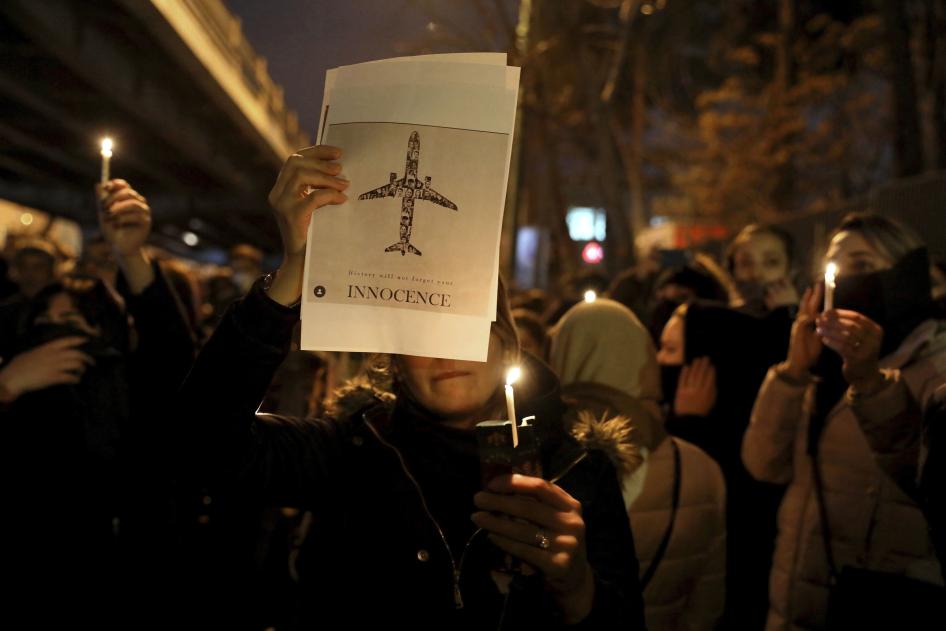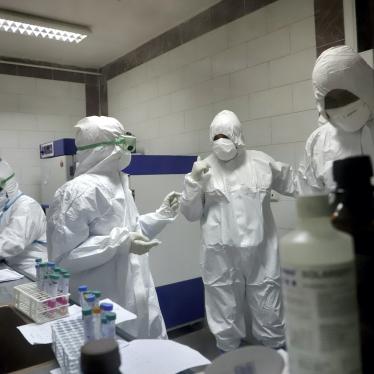(Beirut) – Iranian courts since late April 2020 have sentenced at least 13 people to prison terms, apparently solely for peacefully protesting the Iranian forces’ deadly attack on a civilian airliner and the government’s initial denial of responsibility, Human Rights Watch said today. The authorities should halt all prosecutions that violate the right to peaceful assembly and protest.
Iran’s Revolutionary Guards Corps (IRGC) on January 8 shot down a Ukrainian civilian airliner, killing 176 passengers and crew. After initial denials, on January 11, the Armed Forces Central Command admitted that, following Iran’s retaliatory attacks against a United States base in Iraq, the IRGC forces had “mistakenly” shot down the passenger jet. Protests then broke out across the country. On January 14, Gholamhossein Esmaili, the judiciary spokesman, told reporters that about 30 people had been arrested in connection with the protests and that an unspecified number of people had been arrested in connection with the downing of the plane.
“Iranian authorities are following their usual playbook of dodging accountability,” said Michael Page, deputy Middle East director at Human Rights Watch. “While refusing to provide details about any investigation of culpability for the deadly mistake, judicial officials are wasting no time in sentencing people who protested the loss of 176 lives.”
On May 1, Mostafa Hashemizadeh, a civil engineering student at the University of Tehran, tweeted that Branch 26 of Tehran’s revolutionary court had sentenced him to 5 years in prison on a charge of “assembly and collusion to disrupt national security.” He said the court sentenced him to an additional year in prison, 3 months of public service at a mental hospital, and 74 lashes, and banned him from entering the university dormitory for 2 years for “disrupting public order.”
Amir Mohammad Sharifi, another University of Tehran student who attended the protests, tweeted that the same court sentenced him to six months in prison for engaging in “propaganda against the state.” He said the charge stemmed from his taking of photos of plainclothes officers entering the university dorm and posting the photos on Twitter.
On April 26, the news website Zeitoon published a copy of the verdict in which the revolutionary court in Amol, Mazandran province, sentenced 11 people to 8 months in prison on the charge of promoting “propaganda against the state” for “chanting slogans against the Islamic republic of Iran” and “taking photos and videos” during a candlelight vigil for the victims of the downing of the plane and during the protests afterward.
On January 14, Iranian authorities pledged to investigate the attack, but they have yet to share any details about their investigations. They have also not granted other affected countries access to key evidence. On March 11, the head of Iran’s delegation to the International Civil Aviation Organization told Reuters that Iran “has agreed to send black boxes from a downed Ukrainian jetliner to Kiev for analysis” but Iran still has not surrendered them.
After a member of Parliament said on April 6 that “members of the armed forces have performed their duties” and that “there won’t be any prosecution,” Shokrallah Bahrami, the head of the Judicial Organization of the Armed Forces, rejected that claim and said that at the time, one person remained in detention.
On several occasions officials from Canada, whose nationals constituted the majority of the victims, and other countries whose nationals were on board, have called on Iran to cooperate with multilateral investigative initiatives. Families of the victims have said that they are worried that the Covid-19 pandemic is slowing down any momentum toward justice for their loved ones.
“Instead of prosecuting those who exercised their right to free expression and peaceful assembly, the Iranian authorities should conduct a transparent investigation and cooperate with international bodies to find out exactly what happened in this tragedy,” Page said.







